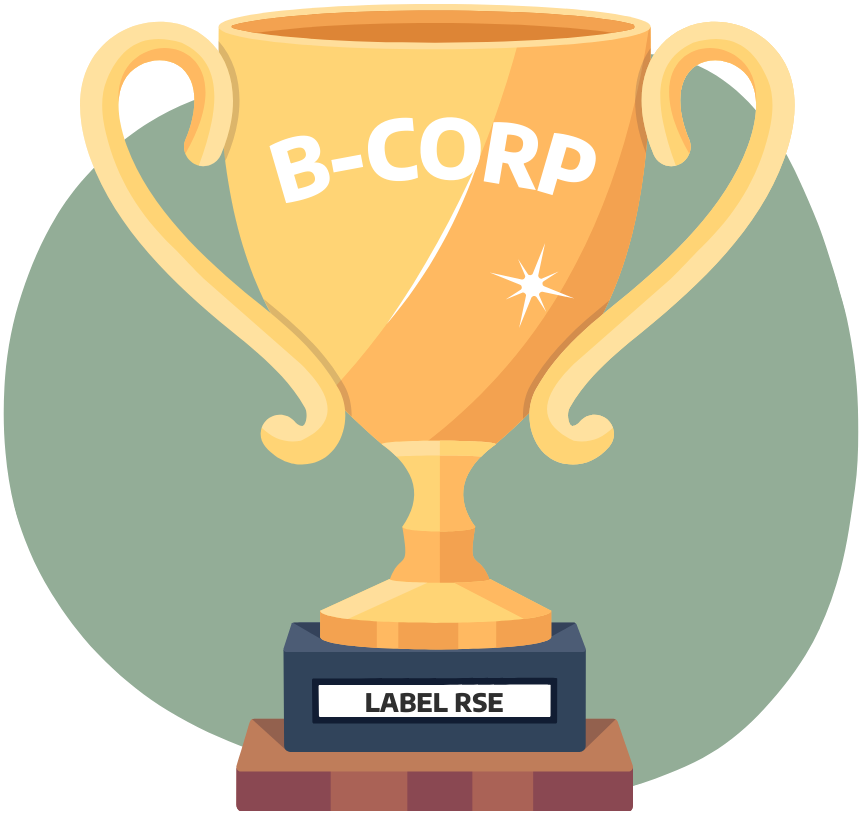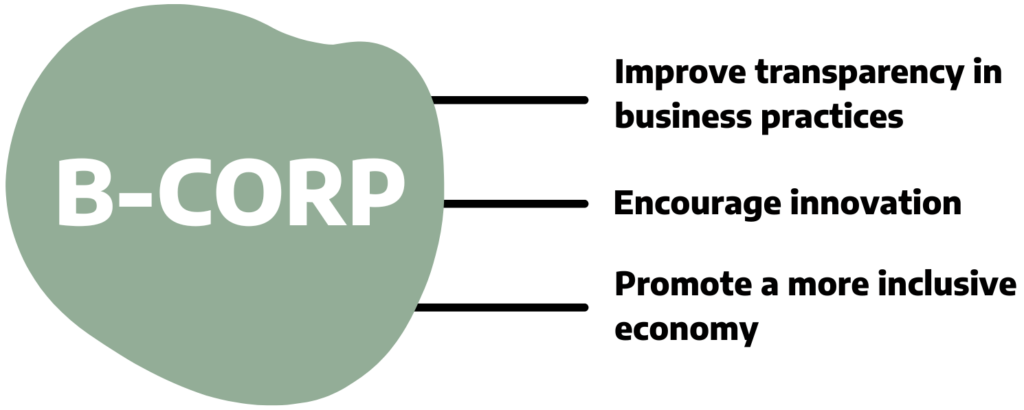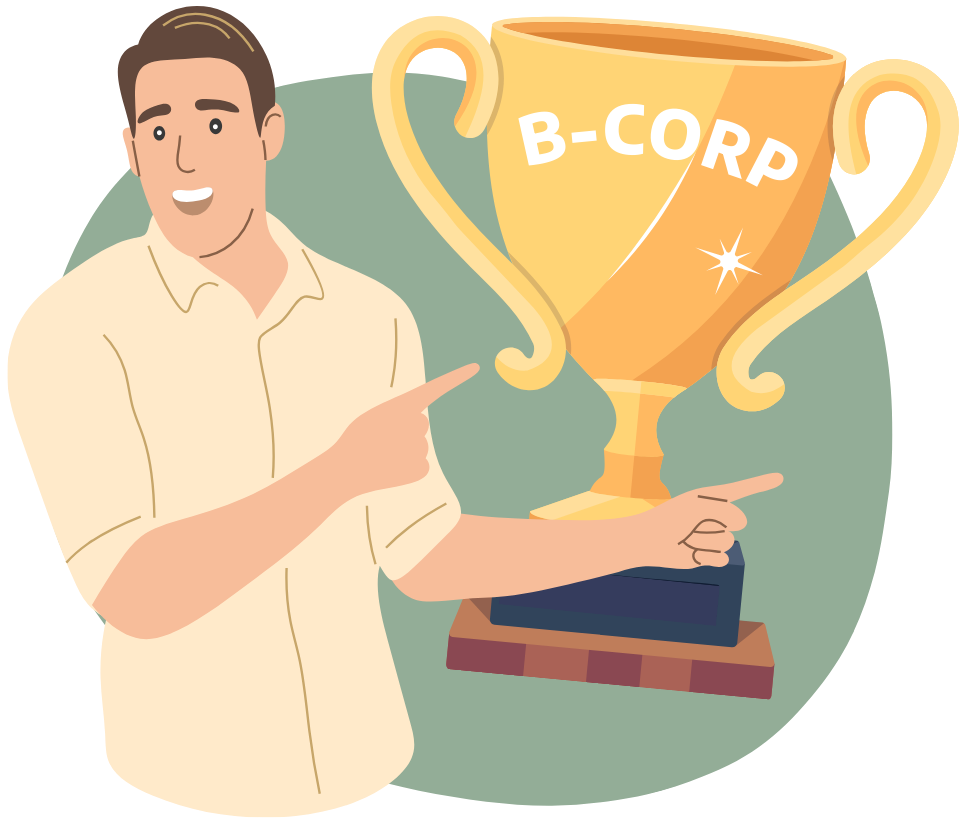B Corp standards are changing in 2025. Anticipate the changes and prepare your company with our practical guide.
All you need to know about B-Corp Certification in 2024
- Mis à jour le 11.06.2025

Welcome to Mon Entreprise Durable by Coptain! Our mission is to enable CSR managers to multiply their impact! Today, we are exploring the B-Corp certification, a prestigious recognition for companies committed to responsible and sustainable practices. The B-Corp label is awarded by the non-profit organization B Lab, and it evaluates companies on their overall social and environmental performance. This certification has become a trusted symbol for consumers and business partners, signifying that the certified company adheres to high standards of transparency, accountability, and performance.
The entire team wishes you a pleasant read!
Here you will find :
The B Corp label is becoming a major competitive advantage. This article reveals how this international certification opens access to new markets and strengthens the credibility of committed companies.
A complete guide to achieving B Corp certification in Switzerland in 2025: process, benefits and tips for success.
Discover the key criteria for obtaining B Corp certification, a prestigious corporate social and environmental responsibility label.
Discover the benefits of the B-Corp label for your Swiss company: increased credibility, international network, differentiation and talent attraction. A complete guide.
This article explains how EcoVadis certification helps companies to structure, assess and improve their CSR practices, with a focus on continuous improvement.
Optimize your EcoVadis score with these 5 practices: understand the criteria, reinforce your CSR policies, involve the whole company, monitor actions and anticipate assessments.
Filling in an EcoVadis questionnaire is a strategic lever for enhancing your CSR commitment. This article will help you structure your answers and succeed in obtaining certification.
What is the B-Corp Certification?
The B-Corp certification is an international recognition awarded to companies that meet high standards of social and environmental performance, accountability, and transparency. It is managed by B Lab, a non-profit organization founded in 2006 in the United States. B Lab’s mission is to redefine business success by encouraging companies to have a positive impact on their employees, communities, and the environment.
Historically, the B-Corp label was created to meet the growing demand from consumers and investors for businesses that not only generate profit but also aim to solve social and environmental issues. The B-Corp movement emerged in a context where trust in large corporations was declining, and sustainability issues were becoming more pressing.

The main goals of the B-Corp certification are to improve transparency in business practices, encourage social and environmental innovation, and promote a more inclusive economy. By obtaining this certification, companies commit to maintaining high standards in several areas: governance, workers, community, environment, and customers. They must also integrate these values into their legal structure to ensure that their social mission remains at the core of their business.
The B-Corp certification process is rigorous and involves a comprehensive assessment of a company’s practices. Companies must achieve a minimum score on the B Impact Assessment (BIA), a tool that measures a company’s overall impact on its stakeholders. This process not only identifies the strengths and weaknesses of current practices but also encourages continuous improvement.
What’s Important to Remember: The B-Corp label offers companies valuable recognition that can enhance their reputation with ethically conscious customers and responsible investors.
When is obtaining the B-Corp Label relevant?
Obtaining the B-Corp label is particularly relevant for companies looking to differentiate themselves in the market through their commitment to sustainability and social responsibility. For small and medium-sized enterprises (SMEs) seeking to strengthen their credibility with ethically-minded customers, this label provides valuable recognition.
It is also relevant for large companies wanting to demonstrate leadership in CSR. Companies operating in sectors where social and environmental issues are crucial, such as food, fashion, or technology, will find the B-Corp label an effective way to prove their commitment to responsible practices. Additionally, for those seeking to attract socially responsible investors or enter new markets sensitive to ethical concerns, the label can be a major strategic asset.
Finally, obtaining the B-Corp certification can help companies improve their internal performance by identifying opportunities for continuous improvement in their social and environmental practices. This can lead to better risk management and greater resilience in the face of today’s economic challenges.
What are the evaluation criteria for obtaining the B-Corp certification?
To obtain the B-Corp label, a company must undergo a rigorous evaluation covering several key aspects:
- Environmental aspects: The evaluation focuses on the management of natural resources, waste reduction, energy efficiency, and overall ecological impact.
- Social aspects: Criteria include respect for human rights, improving working conditions, and promoting diversity and inclusion within the company.
- Ethical aspects: Emphasis is placed on financial transparency, anti-corruption efforts, and business integrity.
The evaluation methodology is based on a detailed questionnaire called the “B Impact Assessment,” which analyzes the company’s overall impact on its stakeholders: employees, customers, local community, and the environment. This assessment is followed by a verification process by B Lab to ensure the accuracy of the information provided. Unlike some labels that offer different levels of certification (such as Ecovadis), the B-Corp label requires companies to reach a minimum overall score to be certified. This score reflects their commitment to high social and environmental performance.
How to obtain the B-Corp certification?
Obtaining the B-Corp label involves several important steps:
- Preparation: Companies must start by conducting a self-diagnosis using the “B Impact Assessment” to identify their strengths and weaknesses in CSR. This often requires thorough internal data collection on their current practices.
- Application Process: Once ready, companies submit their completed assessment to B Lab via its online portal. They must also provide supporting documents to back up their responses.
- Evaluation: After submission, the file is reviewed by B Lab, which may request clarifications or additional information if necessary. A thorough verification is conducted to ensure all declarations are accurate.
- Post-Certification Follow-up: Once certified, companies must maintain their commitment to the high standards of the B-Corp label. They are required to reassess every three years to renew their certification.
- Cost and Duration: The cost varies depending on the company’s size but typically starts around a few thousand euros per year to cover administrative fees related to the process and its ongoing maintenance over time. The entire process can take several months, depending on the company’s initial organizational complexity and readiness before submitting the finalized file to the certifying body, which in this case is, of course, the renowned “B Lab”.

Differences between the B-Corp Label and other CSR certifications
The B-Corp label stands out significantly from other CSR certifications like Ecovadis mainly because of its holistic approach aimed at fundamentally transforming the certified organization’s business model.
While Ecovadis focuses more on specific aspects related to sustainable supply chains, the “B Corporation” label aims for an integral transformation of the business model, fully incorporating social and environmental considerations at the core of the organizational strategy!
Our tips for successfully achieving the B-Corp Label
Here are our tips to maximize your chances of success in your quest for the “B Corporation” certification:
- Best Practices: Ensure that all internal policies are well-documented and aligned with global CSR objectives; involve all stakeholders from the beginning of the process to guarantee the necessary collective buy-in.
- Tools & Resources: Use specialized software to track ESG performance indicators; seek advice from experienced consultants who can guide you throughout your journey to obtaining the label!
- Training & Awareness: Training your employees is one of the fundamental principles of sustainable development so that they better understand why changes are required; internal awareness is crucial to ensure the collective adoption of new initiatives being implemented!
Conclusion
In conclusion, obtaining the “B Corporation” certification offers several significant advantages:
- Enhances the organization’s reputation with customers/investors sensitive to ESG criteria;
- Helps clearly identify current strengths/weaknesses, allowing the implementation of effective corrective plans;
- Facilitates access to international markets or standards that are gradually becoming mandatory or even required by certain major contractors.
Investing in this process represents not only a strategic asset but also a strong commitment towards a more sustainable economic and ecological future!
FAQ
How much does the B-Corp certification cost?
How long does the certification process take?
How to prepare for the B-Corp certification?
Why do companies seek the B-Corp certification?


How can we help you?
I want to know more about you
Our job is to enable CSR managers to multiply their impact!
Our solution: go into “action” mode.
We are organized into a Taskforce. Ready to deploy as soon as we get your GO!


